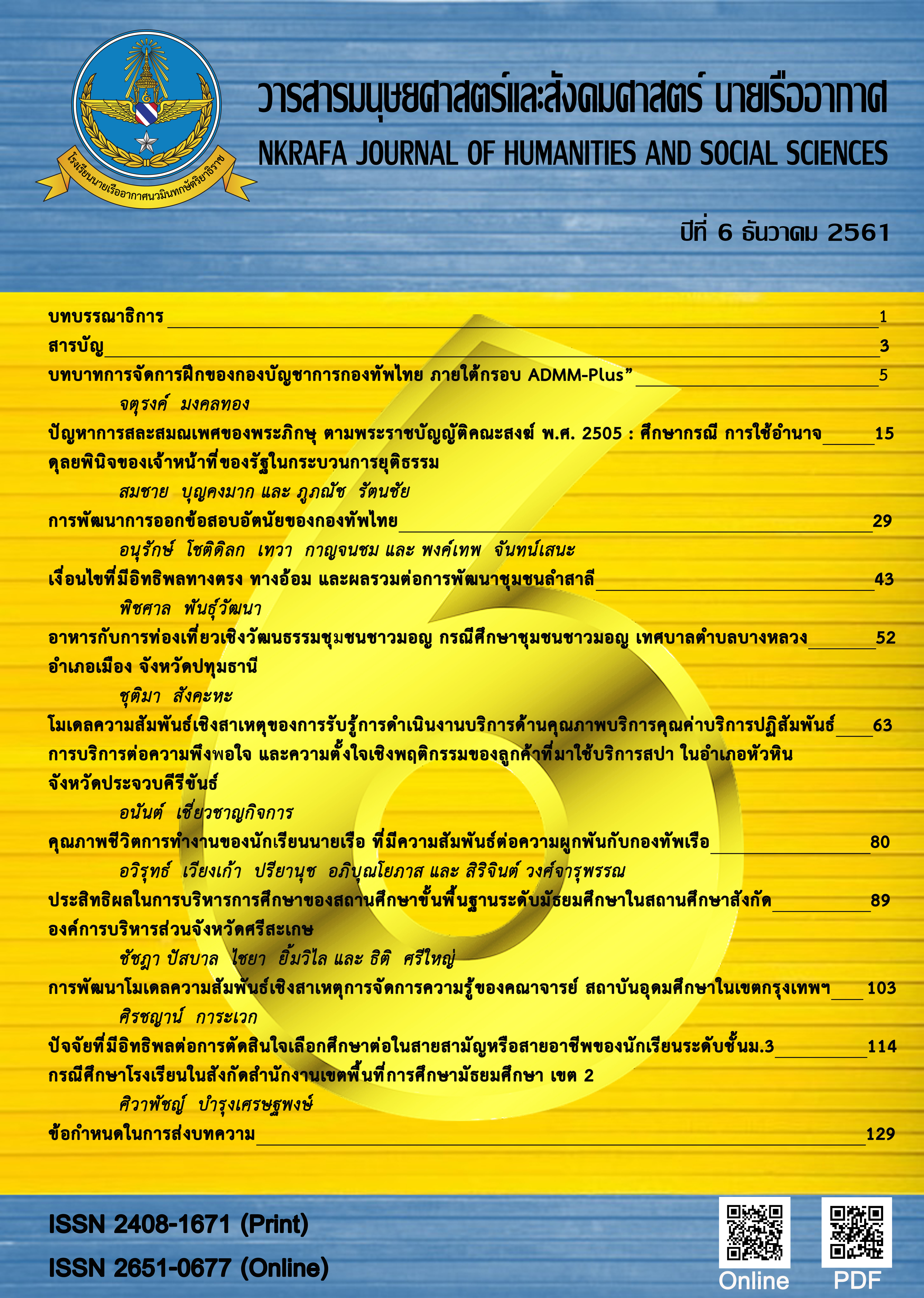Development of Knowledge Management Causal Relationship Model of Teachers of Higher Education Institutions in Bangkok Metropolis
Main Article Content
Abstract
This research is the Quantitative Research. The objectives of the research were 1)to develop the knowledge management causal relationship model of teachers of higher education institutions in Bangkok Metropolis, 2) to examine consistency of the model and the empirical data, and 3)to study direct effect, indirect effect, and collective effect of factors which affected knowledge management of teachers of higher education institutions in Bangkok Metropolis. The population and research sample consisted of 400 teachers fromhigher education institutions in Bangkok Metropolis. The research tool was the online questionnaire. The data analysis was done by the Structural Equation Model (SEM). The research result was the strategic factor had the positive direct and indirect effects towards knowledge management. The organizational factor had the negative direct effect towards knowledge management. Moreover, the knowledge management causal relationship model of teachers of higher education institutions in Bangkok Metropolis fitted with the empirical data with a good level by given Chi-Square of = 72.43, df = 41,
/df = 1.76, GFI = 0.94, CFI = 0.96, AGFI = 0.953, p-value = 0.18, RMSEA = 0.03, RMR = 0.04, SRMR = 0.02and the model was able to mutually account for 69 percent of all variances in the knowledge management.
Article Details
บทความที่ได้รับการตีพิมพ์เป็นลิขสิทธิ์ของวารสารมนุษยศาสตร์และสังคมศาสตร์ นายเรืออากาศ
ข้อความที่ปรากฎในบทความแต่ละเรื่องในวารสารวิชาการเล่มนี้ เป็นความคิดเห็นส่วนตัวของผู้เขียนแต่ละท่าน ไม่เกี่ยวข้องกับโรงเรียนนายเรืออากาศฯ และคณาจารย์ท่านอื่น ๆในโรงเรียนนายเรืออากาศฯ แต่อย่างใด ความรับผิดชอบขององค์ประกอบทั้งหมดของบทความแต่ละเรื่องเป็นของผู้เขียนแต่ละท่าน หากมีความผิดพลาดใด ๆ ผู้เขียนแต่ละท่านจะรับผิดชอบบทความของตนเองแต่เพียงผู้เดียว
References
[2] อดุลเดช ถาวรชาติ, ไพศาล สรรสรวิสุทธิ์ และพิสิษฐ์ จอมบุญเรือง, “ปัจจัยที่ส่งผลต่อการจัดการความรู้ของบุคลากรในมหาวิทยาลัยราชภัฏนครสวรรค์,” วารสารวิชาการบัณฑิตศึกษา มหาวิทยาลัยราชภัฎนครสวรรค์, ปีที่ 7, ฉบับที่ 20, หน้า 123-136, 2555.
[3] Barão, A., Vasconcelos, J.B., Rocha, A. & Pereira, R., “A knowledge management approach to capture organizational learning networks,” International Journal of Information Management, vol.31, no.6, pp.735-740, 2017.
[4] Smokotin, V.M., Petrova G.I. &Gural, S.K. Social and Behavioral Sciences, vol.154 (October), pp.229-232, 2014
[5] López, S.G., Benítez, J.L.S.& Sánchez, J.M.A., “Social knowledge management from the social responsibility of the University for the Promotion of sustainable development,” Social and Behavioral Sciences, vol.191, June 2015, pp.2112-2116, 2015.
[6] อทิต พลจันทึก, การจัดการความรู้ที่ส่งผลต่อประสิทธิผลด้านการศึกษาของกรมยุทธศึกษาทหารอากาศ, วิทยานิพนธ์ปริญญาศึกษาศาสตรมหาบัณฑิต, สาขาวิชาเทคโนโลยีการบริหารการศึกษา, มหาวิทยาลัยเทคโนโลยี ราชมงคลธัญบุรี, 2556.
[7] Hair, J. F., Black, W. C., Babin, B. J., &Andrson, R. E., Multivariate data analysis: A global perspective, New Jersey: Prentice-Hall, pp.145-146, 2010.
[8] Sakunpong, N., Choochom, O. &Taephant, N., “Development of a resilience scale for Thai substance-dependent women: A mixed methods approach,” Asian Journal of Psychiatry, vol.22, pp.177-181, 2016.
[9] Gliem, J. A. & Gliem, R. R., “Calculating, Interpreting, and reporting Cronbach’s Alpha reliability coefficient for Likert-type scales,” Conference in Adult, Continuing, and Community Education, pp.82-88, 2003.
[10] กัลยารัตน์ ธีระธนชัยกุล, “การจัดการความรู้...ปัจจัยสู่ความสำเร็จ,” วารสารปัญญาภิวัฒน์, ปีที่ 5, ฉบับพิเศษ, หน้า 134-144, 2557
[11] Jafari,S.M., Irani, H.R. &Rezaei, D., Identifying organizational factors affecting individual knowledge creation, International Conference on Nascent Technologies in the Engineering Field (ICNTE-2017), pp. 1-6, 2017.
[12] Petrova, G.I., Smokotin, V.M., Kornienko, A.A., Ershova, I.A. &Kachalov, N.A., “Knowledge management as a strategy for the administration of education in the Research University,” Social and Behavioral Sciences, vol.166, pp.451-455, 2015.
[13] Wei, Y. &Miraglia, S., “Organizational culture and knowledge transfer in project-based organizations: Theoretical insights from a Chinese construction firm,” International Journal of Project Management, vol.35, no.4, pp.571-885, 2017.
[14] Ahmady, G.A., Nikooravesh, A. &Mehrpour, M., “Effect of organizational culture on knowledge management based on Denison model,” Social and Behavioral Sciences, vol.230, September, pp.387-395, 2016.
[15] Mao, H., Liu, S., Zhang, J. and Deng, Z., Information technology resource, knowledge management capability, and competitive advantage: The moderating role of resource commitment,” International Journal of Information Management, vol.36, pp.1062-1074, 2016.
[16] Hau, Y.S., Kim, B., Lee, H. & Kim, Y.G., “The effects of individual motivations and social capital on employees’ tacit and explicit knowledge sharing intentions,” International Journal of Information Management, vol.33, no.2, pp.356-366, 2013.


